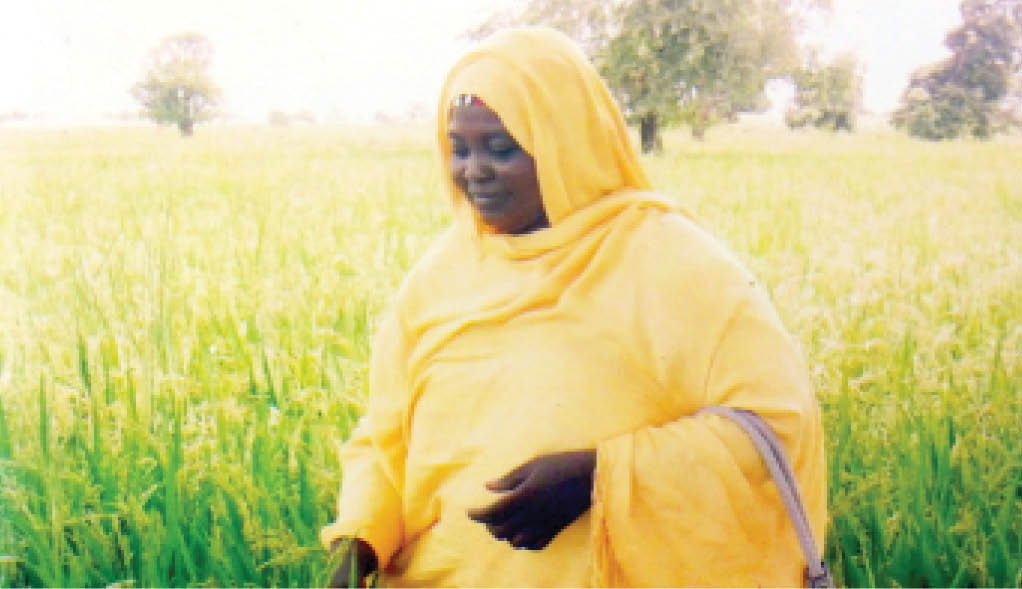Female farmers’ greatest challenge is access to fund – Hajiya Sidiya
Hajiya Sidiya Fatima Shareef is the chairperson of the women wing of the All Farmers Association of Nigeria (AFAN). In this interview, Hajiya Sidiya, who started as a backyard farmer and rose to become the chairperson of women farmers in Kano State, spoke on the challenges they face in a male-dominated sector, among other issues. […]

Hajiya Fatima Shareef in one of her rice farms at Kadawa
Hajiya Sidiya Fatima Shareef is the chairperson of the women wing of the All Farmers Association of Nigeria (AFAN). In this interview, Hajiya Sidiya, who started as a backyard farmer and rose to become the chairperson of women farmers in Kano State, spoke on the challenges they face in a male-dominated sector, among other issues.
How did you venture into farming?
I started going to farm when I was in primary school. I got married after my primary education. However, after decades of marriage, my husband died. It was after the death of my husband that I began to practise agriculture from the back of our house. I discovered the various benefits I stood to gain should I expand my farming activities. That was how I went to another village closer to mine and hired a bigger farm. With the proceeds from my backyard, I was able to get a huge harvest that year. That marked my journey into full agriculture.
Fortunately, I was able to grow from a peasant to a commercial farmer. And my success as a female farmer has inspired a lot of women to embrace farming as a means of livelihood. I was able to make them understand that being a farmer doesn’t mean that one must till the soil or plant crops. I made them see the various opportunities attached to farming by picking a chain out of a single crop value chain and invest in it.
A female farmer can be a rice boiler, thrasher or input supplier. A woman can also be a beneficiary of the value addition component of a particular crop of cereal. Many are presently earning a living through that. Such women, as far as we are concerned, are also farmers.
What would you say is your greatest achievement as a female farmer?
To be honest, through agriculture I was able to give my children the basic education they require. My son did his first degree in Uganda, and presently, he is in India for his second degree. I have a daughter currently studying in the Maryam Abacha American University (MAAUN) in the Republic of Niger. Others are attending other schools in Nigeria. I have seven children, two are late now and five are still alive and schooling.
Can you tell us more about your association in Kano?
It is a group of over 20,000 women across the 44 local government areas of the state. It is a cluster of women involved in all the sectors of agriculture along the value chains. For instance, I am specifically involved in rice farming. I singlehandedly grow over 800 bags of paddy rice annually. There are other women that grow millet, sorghum, maize and other farm produce, as well as processors. The women wing has been one of the major contributors in the current agricultural development achieved in the state and the country in general.
How have you been copping in a male-dominated sector?
It is apparent that farming has become everyone’s business, but one of the challenges we have been facing in what is seen today as a male-dominated sector is lack of adequate intervention for women. Although there is a lot of interventions from the government and other agricultural partners in the country, unfortunately, the males have dominated it. However, women have been considered partially.
Another challenge is late arrival of intended interventions, which makes it more or less irrelevant. This is something we have been calling on the authorities for years to take into consideration, but our calls tend to fall on deaf ears.
The greatest challenge female farmers face is that of accessing funds. No doubt, there are a lot of funds to facilitate agriculture, especially by the current administration, but sadly, most of the provisions enshrined under the scheme to access funds by women could not be met by rural farmers, especially those having valid bank accounts. Most of these women are residing in remote areas where they cannot get access to banks, and due to tradition and economic bottlenecks, they cannot travel to their respective local government secretariats where such banks exist to open accounts.
How would you compare farming then and now?
In those days, farming was only a means to get food, but now, it has been transformed into a totally sustainable business that has exposed a lot of positive developments in the country’s economy. Today, a farmer is not seen as someone who has no future but a respected personality that plays a very vital role in everyone’s livelihood.
